Posted on 2013-Apr-06
In the previous blog, we covered how Bangkok is chosen to be designated World Book Capital 2013. There is no doubt that 41st National Book Fair will be the destination we must visit to see where the Thai publishing industry is heading. Right at the entrance to the book fair situated the official statement signed by IBF, IPA, IFLA, UNESCO proclaiming Bangkok’s mission to “bring together all stakeholders of the book supply chain and beyond.” Apart from publishers, authors, and organizers, the army of readers united in the front row to signifies the rapidly growing market as you can see from the photos below. But what can we learn from the book fair held annually to attract buyers from all over Thailand to leave the venue with duffel bags full of discounted books?
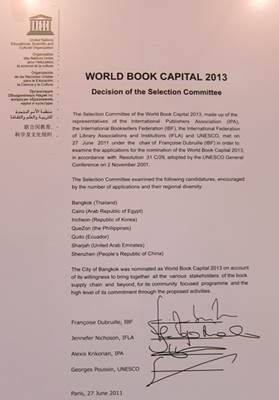
Bangkok as World Book Capital Programs and Activities
Bangkok by the Department of Culture, Sports, and Tourism started the grand opening ceremony of 41st Bangkok Book Fair and 11th International Book Fair from Mar 29 – Apr 8, 2013. To read how Bangkok is awarded such a prestigious honor from UNESCO and how the Thai publishing industry has grown, please read this statement on their website. Aside from many activities going on and off the stage, it is important to learn that reading will be taken seriously nationwide with the healthy support from the government. The Publishers and Booksellers Association of Thailand (PUBAT) is also eager to invite several publishers to join the seminars to discuss the future of the industry. Please see more photos at our Facebook album page.
e-Textbook Outlook
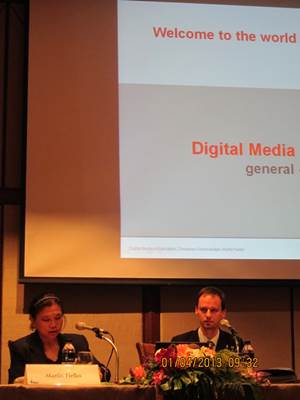
Representing BB eBooks, I signed up with “Developing Entrepreneurial Capacity of e-Textbook Business in Thailand.” Before understanding the Thai publisher’s context, Martin Fielko, Foreign Rights Manager of Cornelsen Schulverlage, German educational media company, shared his insight about digital media in education. According to Martin, e-Textbooks still face an uphill climb in many countries despite the government’s financial support in European countries (e.g. Norway, Poland, Catalonia). Martin stressed the lack of infrastructure to keep digital media in most classes.
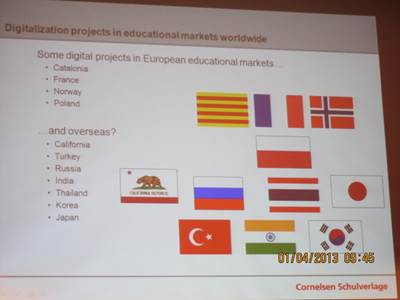
Under many circumstances, the tablets are inadequately supplied to the schools due to high investment costs. In Germany, although teachers can prepare their lessons on computers, most schools cannot provide enough IT equipment in classrooms, resulting in less implementation of using digital media during their lessons. South Korea’s Smart Education Project, hoping to eliminate the use of print textbooks, creates conflict between publishers of which they could not agree which format they will adopt when the parents are further worried about internet addiction.
The format issue seems like a daunting obstacle that most publishers could not agree on. That is why Cornelsen came up with Digitale Schulbücher (source link in German). It is an educational project to provide code-based service for schools to access digital textbooks online. Schools can buy codes to order classroom materials and students can synchronize notes and reading progress through online and offline mechanisms. The offline solution solves the shortage of internet connectivity in certain schools. The project focuses on quality-based content rather than format-based worries for schools. So far, Cornelsen has reached out to 800,000 teachers in Germany.
Although there are conflicts and obstacles about the format and how teachers can implement technology to aid their classroom lessons, it is undeniable that digital media in education is in its infancy stage as it is being adopted by many countries worldwide. Given the example of the teachers producing their own lessons digitally, it is apparent that the textbook publishers must adapt to exist in this new chapter of technology or they may face extinction. Martin said that the content creator-teacher will not need publishers any longer to give them access to content distribution since they can self-publish. They can deliver the content straight to their audience: whether they be fellow teachers or students. Publishers need to step up their game and work out how to be a learning company and provide value-added services for the content creator. For example, they must be able to produce enhanced content, handle rights, and provide tools and devices to evaluate students according to the curriculum. There is a new medium for open source educational opportunity named Open Educational Resources (OER) that might revolutionize the way textbooks are published with freely accessible information from Wikipedia.
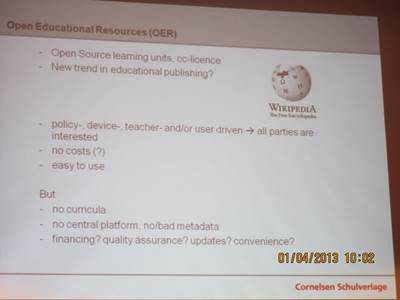
In the Czech Republic, the ongoing development of open source eBooks is seen as a great strategy to promote digital media for many reasons. Having focused on the emerging market, Fraus publisher’s book, developed by Cornelson, plans to standardize the open format that is not PDF to enhance their book. They also plan to enable convenient purchasing options via popular mobile stores on Google or Apple and provide necessary tools for authors and media database in the production process. They meet their goal of promoting their books on Facebook within three months to garner 1,000 likes. Their future plan is to expand to non-school markets and become the strong player in digital conversion. Textbooks, according to Cornelsen, will not be just a bland, one-dimensional learning ecosystem. It will be converted into formats to add interactive features into their content. Aside from technological developments, other sources of revenue will be sketched out how their enhanced books will make money. They will consider testing and trying flat fees for institutes, launching subscription-based plan, online lending and borrowing, freemium offers.
Looking Inward
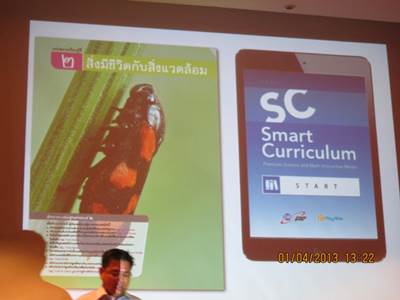
After the morning session ended, the Thai textbook publisher, Aksorn Charoen Tat, seems to agree with Martin that technological advancement is not the only viable solution textbook publishers should pursue. The hardware is one jigsaw puzzle to piece together educational solutions for students and schools, but the current domination of PDF is not the true answer. Unfortunately, government materials have been faced with such a bottleneck that has not added value to their content. What end-users want are high quality data, communication, and collaboration. They need a more exciting Learning Media Ecosystem (LMS) for young students and adults to study. Less blank space in fixed layouts, more interactive features, and easier sharing options could make a textbook more exciting. In reality, students have grown accustom to social media updates and they deserve nice graphics to brighten their classroom study (e.g. Infographics, videos, and pictures). The speaker criticizes the introduction of tablets to first-graders through the One Tablet Per Child program saying that the government has spent too much effort in promoting hardware specifications yet overlooked the production of digital content that traditional teachers are not familiar with. The lack of infrastructure in classrooms is echoed again in Thailand. Most public schools in Bangkok still do not have access to high-speed internet to enjoy the joy of learning on tablets. So far, the local publisher is developing interactive and graphical content to be compatible with first-graders’ tablets.
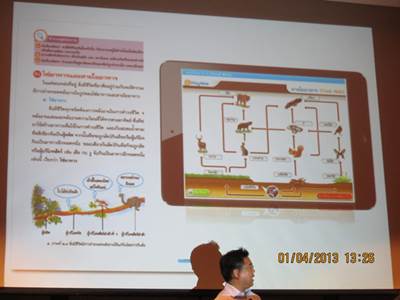
Finding Needles in the Haystack

Before venturing out in the book fair to indulge in a massive catalogue of rare books, I managed to squeeze into the densely populated crowd and made my way to explore what eBook expo could offer. The PR materials looked promising from the outside but the locked ecosystem was disappointing. There was one bookshop and a mobile operator promoting their digital content in PDF format. The salesperson said that EPUB cannot provide the perfect solution for Thai fixed layout fascination. Proprietary format in the disguise of PDF can incorporate interactive features like moving clouds to appear in the travel magazine—BB eBooks strongly disagrees with this. I was not surprised not to find the work of fiction in eBook format in their virtual store when digital magazines have remained the popular choice. Loitering further in the less-crowded area, the Writers’ Association of Thailand hid itself in the modest space attracting few people to stop by and peruse the literary works. Trading thoughts with a representative, I learnt that most writers are locked in the ecosystem where they need external support to fund their writing projects. For example, a good book of Thai-Malay literature that is translated into 3 languages-Thai, Malay, English-was only printed in a print run of 200-300 copies with the help of a public organization to be given away. The author did not get the royalties due to limitations specified in the contract. I was so sadly disappointed by the limitation that I discussed the advantage of eBook and was eventually invited to attend the Writer’s Day early next month to talk about eBook solution for authors.
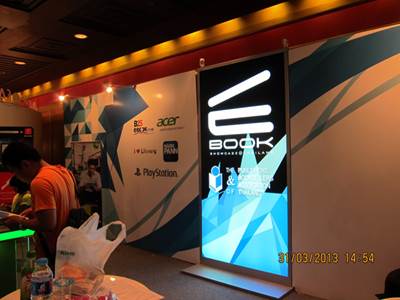
The Next Step Forward
Reading for Life will be a great solution for all parties involved to improve literacy skills and help a new generation of readers find their lifelong passion. In the context of educational markets, the war of digital media format might be dissolved when open source is adopted. With the latest enhancement of EPUB 3, it will surely bring new level of interactive features to teaching materials. However, the government needs to better support the production process rather than investing in hardware that lacks content. Textbook publishers in the new eBook era need to find ways to facilitate content creators to enhance their content because the creators will improve their capacity to directly communicate with the audience bypassing traditional ecosystem as the sole gate keeper. Last but not least, local authors need to study more possibilities to distribute their works digitally to reach their audience in a more affordable and effective way.
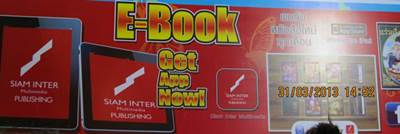
Label: eBook Industry News
comments powered by Disqus